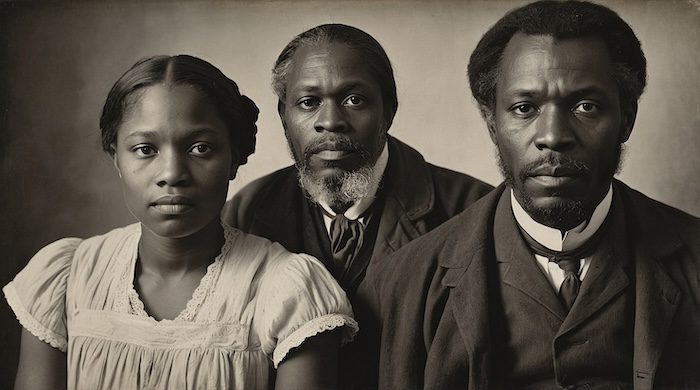Getting to Know the Freedmen’s Bureau
The Bureau of Refugees, Freedmen, and Abandoned Lands, better known as the Freedmen’s Bureau, was established in March 1865 to help rebuild the South after the Civil War. Its mission was to assist formerly enslaved African Americans and poor Southern whites by providing food, shelter, education, medical care, and legal support.
The Bureau was America’s first federal agency created for large-scale social welfare. It became a bridge from slavery to freedom, working to protect the rights and dignity of millions of freedpeople entering citizenship for the first time.
- Click to View M1900-M1913 Freedmen’s Bureau Field Offices
History of the Freedmen’s Bureau
Led by Major General Oliver O. Howard, the Bureau operated in every former Confederate state and the District of Columbia.
At its height, the Bureau:
- ➡️ Ran over 900 field offices across the South.
- ➡️ Supervised 4,000+ schools and 40 hospitals.
- ➡️ Helped thousands of freedpeople create labor contracts.
- ➡️ Documented families and individuals once erased from official records.

Library of Congress
Levels of the Freedmen's Bureau
1865-1872
Headquarters
Based in Washington, D.C., headquarters set policy, funded operations, coordinated agencies, and reported to Congress, guiding education, labor, legal aid, relief, and land programs across states.
(National Level)
Superintendents of Education
At state and district levels, superintendents organized schools, recruited teachers, partnered with charities, allocated funds, tracked enrollment and literacy, and linked headquarters policy to local needs.
(State-Level and Regional)
Field Offices
In towns and counties, field offices delivered services: mediating labor contracts, distributing rations and medical aid, reuniting families, supporting schools, recording complaints, and producing genealogical records.
(Local Level)
Purpose of the Freedmen's Bureau
Education
Establishing schools to educate freedmen and their children, many of whom had been denied literacy during slavery.
Employment
Facilitating labor contracts between freedmen and landowners to provide work opportunities.
Healthcare
Setting up hospitals and providing medical care to freedmen.
Legal Assistance
Offering legal protection for African Americans, particularly in disputes regarding labor, property, or civil rights.
Relief Efforts
Providing food, clothing, and basic necessities to displaced individuals.
Land Redistribution
Managing confiscated or abandoned lands and attempting (though often unsuccessfully) to allocate land to freed families.
These records typically involve claims made by formerly enslaved individuals or Union loyalists who lost property during the Civil War. They might include claims for lost wages, compensation for injuries, or restitution for property taken or destroyed by military forces.
These contain details of legal proceedings and decisions made by the Freedmen’s Bureau courts. The Bureau set up its own legal system to adjudicate issues involving freed people, such as disputes over labor contracts, cases of racial discrimination, and violence against African Americans.
These provide information about the medical services provided by the Bureau. They include records of hospital admissions, treatments given to freed people, and sometimes details of specific medical conditions and health issues prevalent at the time.
These documents record agreements between employers and employees. After emancipation, many freed people entered into labor contracts with former owners or new employers. Records of indenture and apprenticeship often involve agreements for minors who were to be trained in a trade.
These include information about the allocation and use of abandoned or confiscated lands and properties. The Bureau played a role in redistributing land to freed people, a key aspect of Reconstruction-era policies.
These records likely pertain to individuals who were hired for specific tasks or services, and possibly list the items or equipment that were also hired out for use.
These are records of complaints made by freed people to the Bureau, often regarding unfair labor practices, disputes over wages, racial discrimination, or violence. They provide insight into the challenges faced by African Americans during the Reconstruction era.
These are records of complaints made by freed people to the Bureau, often regarding unfair labor practices, disputes over wages, racial discrimination, or violence. They provide insight into the challenges faced by African Americans during the Reconstruction era.


Why the Bureau Failed
Despite extraordinary efforts, the Bureau’s achievements were limited by structural and political obstacles:
- ➡️ Chronic Underfunding: Congress never gave the Bureau enough money or staff to meet its vast responsibilities.
- ➡️ Southern Resistance: White landowners, militias, and politicians fought against its authority, often violently.
- ➡️ Racist Opposition in Washington: Political backlash grew, especially after President Andrew Johnson vetoed extensions of the Bureau’s powers.
- ➡️ Sheer Scale of the Task: Assisting four million freedpeople while rebuilding a destroyed South was beyond the Bureau’s capacity.
By 1872, Congress dismantled the Bureau. Its premature closure left many needs unmet. Still, the records it generated remain priceless, documenting lives at the very moment African Americans stepped into freedom.
Locating the Freedmen's Bureau Records?
| Resource | Description | Link |
| Ancestry.com - Freedmen’s Bureau records | Paid site with vast genealogy and Freedmen’s Bureau records. | Open |
| BPOG — Freedmen’s Bureau Records | Your curated entry point and guidance on using Bureau records. | Open |
| Discover Freedmen | FamilySearch and NMAAHC project indexing records of the formerly enslaved. | Open |
| FamilySearch — Freedmen’s Bureau Records | FamilySearch Freedmen's Bureau Wiki | Open |
| Freedmen’s Bureau Online | Volunteer site sharing transcribed Bureau documents. | Open |
| Freedmen’s Bureau Project | Digitized Bureau records; name indexing. | Open |
| Freedmen and Southern Society Project | Cases Adjudicated by the Freedmen's Bureau Superintendent at Gordonsville, Virginia | Open |
| NARA — Freedmen’s Bureau | Record Group & microfilm guides (all states). | Open |
| National Museum of African American History & Culture - NMAAHC | Smithsonian museum offering digital archives on African American history. | Open |
| Mapping the Freedmen’s Bureau | GIS map of offices, schools, labor contracts. | Open |
| Freedmen's Bureau Search Portal | Smithsonian searching Bureau materials. | Open |
| Searching the Freedmen’s Bureau Records | Smithsonian guide to researching Bureau materials. | Open |
| The Freedmen’s Bureau Records | Smithsonian collection of digitized Bureau files. | Open |


